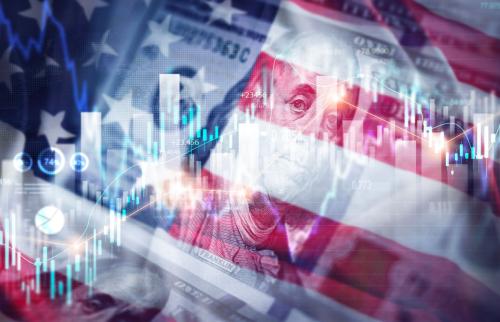“Why is the world so enamored of the dollar?” asked Eswar Prasad, during an event to launch his new book, The Dollar Trap: How the U.S. Dollar Tightened Its Grip on Global Finance.
David Wessel, director of the new Hutchins Center on Fiscal and Monetary Policy, who moderated the expert panel, posed a challenging question at the outset of the event:
Given that the United States seems determined to demonstrate that we don’t know how to run a financial system, we have a democracy that’s dysfunctional, and we’re living beyond our means, why in God’s name does the rest of the world have so much appetite for U.S. dollars?
Prasad, a Brookings senior fellow and professor at Cornell University, explained that the dollar’s value has remained stable despite the financial crisis, and that investors worldwide continue to see the dollar as the safest financial asset.
The Dollar Has Remained Stable
Sixty percent of net U.S. public debt, which rose about $5.5 trillion between 2007 and 2013, was acquired by international investors, he said. “And although the U.S. has been at the center of many of these troubles, and despite all the easy money policies,” he continued, “on a trade-weighted basis, the dollar is pretty much where it is today where it was right before the financial crisis.”
Further, despite the “non-zero probability that the U.S. might actually default on its debt” in the fall of 2013, when, as Prasad explained, Senator Ted Cruz “was commandeering the Senate floor … reading aloud Green Eggs and Ham,” the dollar remained flat and Treasury-bond yields decreased. By contrast, typically in other countries facing the prospect of default on debt, their currency depreciated as money flowed out and bond yields rose.
“Time and again, anytime there is financial turmoil anywhere in the world, including in the U.S. itself, money tends to come to the U.S. in search of a safe haven. … Why is it that the world seems to be so enamored of the dollar?” The answer, Prasad says, lies in the laws of supply and demand. “The main provider of financial safe assets, especially thanks to all the public debt that is being issued here, is the U.S.”
The United States’ “Magic Combination”
While the dollar may no longer remain the dominant unit of account, or the medium of exchange, “it is as a store of value that the dollar remains predominant.”
Why should the world trust a country where the politics seems to be messed up, where the debt levels are rising, where monetary policy seems to be running on fumes? And here I argue that in addition to problems with the international monetary system … the U.S. has put together a magic combination which is going to be very difficult for any other country in the world to match. It’s not just size. It’s not just depth and liquidity of financial markets. But also a very robust set of public institutions and political institutions, including a trusted central bank, and also an open and democratic system of government.
This is important, Prasad explained, because $4.5 trillion of public debt is held domestically, as he described:
And who holds Treasury securities? It turns out to be largely pensioners, who happen to live … in swing states like Florida. It’s insurance funds. It’s state and local governments. And these are all politically very powerful. So from the foreign investors’ point-of-view, looking into the U.S., it seems like a rational proposition to say that the U.S. would never use a strategy of using default to reduce the real value of its debt because there would be enormous political consequences to pay.
Would the Chinese Renminbi Be a Safe Haven?
Is it likely that the Chinese renminbi would be seen as a safe haven currency?
Given the nature of political and legal institutions there, foreign investors are unlikely to trust China as a safe haven. Indeed, all the evidence suggests that the Chinese themselves don’t trust China. So it’s hard to see international investors seeing China as a safe haven. So no doubt that the renminbi is going to become a viable, important reserve currency, but it’s not going to threaten the dollar’s role.
We Are Stuck with the Dollar
In closing, Prasad summed up:
This is not really a story about American exceptionalism. One of the curious aspects of what we are seeing right now is that dollar in its role as a safe haven currency, a reserve currency, is actually strengthening while U.S. economic and political influence around the world seems to be getting enervated to some extent. So ultimately this is a fault not just of the international monetary system, but the fact that there aren’t other countries and institutions capable of picking up the slack.
If Europe could get its act together the euro could perhaps become once again a viable competitor. If China were to undertake the reforms it needs, both economically but also much more broadly in terms of its institutions, the renminbi could become a viable competitor. But for now, we are stuck with the dollar.
The panelists included: Charles Collyns, managing director and chief economist at the Institute of International Finance; Luis Alberto Moreno, president of the Inter-American Development Bank; and Jose De Gregorio, a professor at the University of Chile and a nonresident senior fellow at the Peterson Institute for International Economics.
The event was hosted by Global Economy and Development at Brookings.
The Brookings Institution is committed to quality, independence, and impact.
We are supported by a diverse array of funders. In line with our values and policies, each Brookings publication represents the sole views of its author(s).




Commentary
Why the World Continues to Love the Dollar
January 15, 2014